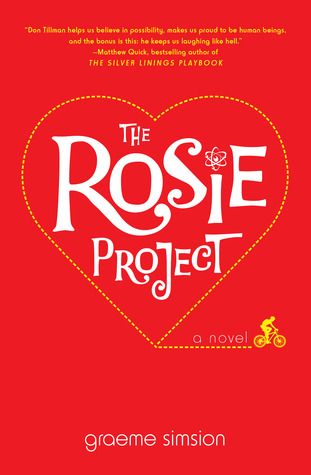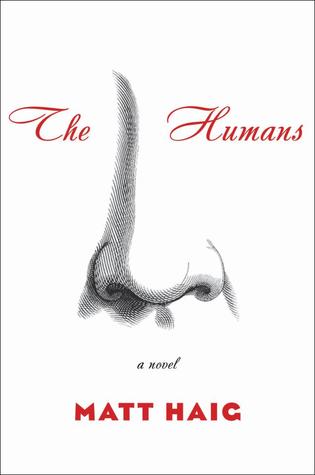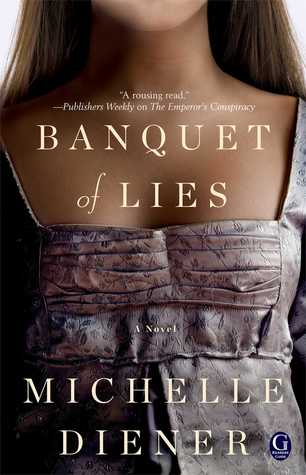- Title: The Rosie Project

- Author: Graeme Simsion
- Genre: Mainstream
- Format: Paperback
- Source: Library
- Reviewed by: Olga
- Rating: 5 out of 5
Description: An international sensation, this hilarious, feel-good novel is narrated by an oddly charming and socially challenged genetics professor on an unusual quest: to find out if he is capable of true love.
Don Tillman, professor of genetics, has never been on a second date. He is a man who can count all his friends on the fingers of one hand, whose lifelong difficulty with social rituals has convinced him that he is simply not wired for romance. So when an acquaintance informs him that he would make a “wonderful” husband, his first reaction is shock. Yet he must concede to the statistical probability that there is someone for everyone, and he embarks upon The Wife Project. In the orderly, evidence-based manner with which he approaches all things, Don sets out to find the perfect partner. She will be punctual and logical—most definitely not a barmaid, a smoker, a drinker, or a late-arriver.
Yet Rosie Jarman is all these things. She is also beguiling, fiery, intelligent—and on a quest of her own. She is looking for her biological father, a search that a certain DNA expert might be able to help her with. Don’s Wife Project takes a back burner to the Father Project and an unlikely relationship blooms, forcing the scientifically minded geneticist to confront the spontaneous whirlwind that is Rosie—and the realization that love is not always what looks good on paper.
Review: I loved this book, loved everything in it: from its rosy title (pun intended) and its vulnerable protagonist to the subtle, slightly twisted humor, simple plot, and complex psychology.
The novel starts with the hero Don preparing a lecture on Asperger’s syndrome. According to his research (and mine), most of Asperger’s symptoms are “simply variation in human brain function that had been inappropriately medicalised because they didn’t fit social norms—constructed social norms—that reflected the most common human configurations rather than the full range.”
The deviations have to do with the social milieu. Simply put, Aspergers are dismal at social interactions. Their empathy is askew, and as a result, many consider them odd and undesirable as companions. Aspergers don’t fit in almost any company, and neither does Don. He knows he is inept at communications and dismal with women, but despite being a brilliant genetics scientist and an extremely smart person, he doesn’t recognize Asperger’s in himself. He just knows that he is different and lonely and he wants to share his life with a good woman.
Alas, dating has never worked for him. He’s never even had a second date, so instead he decides on the scientific approach: he constructs a 16-pages questionnaire of multiple choice questions and posts it online, hoping that at least one suitable applicant will answer all his questions correctly. He calls it a “Wife Project.”
Then Rosie enters his life. She is a psychology student and totally unsuitable, according to his questionnaire. Her every answer is wrong, she is opinionated and sarcastic, chaotic and emotional. And she smokes. Nonetheless, Don feels happy whenever he is with her. Unfamiliar with the feeling, this usually detached man stumbles like a toddler, breaks all his routines, belatedly learns to navigate the emotional landscape, and fails again and again. And still he wouldn’t give up.
Don’s personal journey is sad, poignant, and uplifting, almost painful in its intensity and honesty, but the book is so full of humor, so light and hopeful that reading it feels like flying. You’re dizzy from the quick visceral transitions, from the juxtapositions of the incomparable. One moment, you laugh hysterically, riding the mirth wave, the next you swallow a lump in your throat, plunging into Don’s despair.
Sometimes, both feelings interweave and you can’t separate them: like when Don practices cha-cha dancing with a skeleton, on loan from the Anatomy department. Or when he practices sex with the same skeleton, exercising different positions from an illustrated manual.
When his friend Gene talks to Don about sex, you wince and laugh and shake your head and squirm with pity for the poor schmuck. That twisted Asperger’s chemistry in his brain is really screwing his life.
‘You have had sex before?’
‘Of course,’ I said. ‘My doctor is strongly in favor.’
‘Frontiers of medical science,’ said Gene.
He was probably making a joke. I think the value of regular sex has been known for some time.
I explained further. ‘It’s just that adding a second person makes it more complicated.’
‘Naturally,’ said Gene. ‘I should have thought of that.’
Don’s intelligence and erudition are amazing, but his inability to discern symbolism, to identify colloquialisms is equally astounding.
‘If I find a partner, which seems increasingly unlikely, I wouldn’t want a sexual relationship with anyone else. But I’m not good at understanding what other people want.’
‘Tell me something I don’t know,’ said Rosie for no obvious reason.
I quickly searched my mind for an interesting fact. ‘Ahhh…The testicles of drone bees and wasp spiders explode during sex.’
No wonder, he is stuck on sex theme. The guy is head over heels in love with Rosie but doesn’t know how to express himself. His psychological deficiency hampers him, makes him socially and emotionally lame.
I know the feeling; it resonates with me. When I read about Don’s bumbling romance, the zing of recognition was very loud. Like Don, I have Asperger’s. Like him, I’m schooled in self-damnation: ‘Nothing would change the fault in my brain that made me unacceptable.’ Those are his bitter words, but I couldn’t take my eyes off them. Those are my words too.
The love story of Don and Rosie is written beautifully, without melodrama or clinical aloofness. The writing flows like a stream and carries you along the ups and downs of Don’s life. The plot moves fast, and the characters are all 3-dimentional. But Don stands out among his book-mates. He is the real hero, and his courage in overcoming his affliction, in ‘rewiring’ his brain, makes this multilayered book much more than a comic romantic caper. It’s also a tale of his profound transformation, a painful quest to find his place among all of us… and keep it.
This was one of the best books of the past year. Highly recommended.





